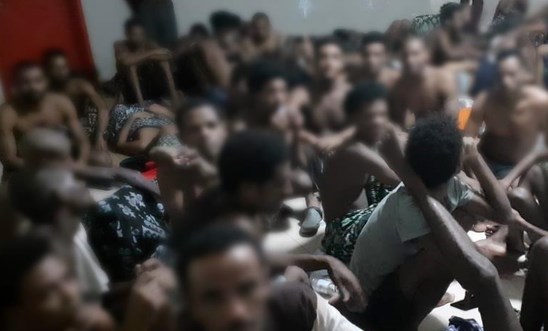KSA hides abuses in migrant centers amid arrests campaign
Oppression and abuse are rampant within Saudi Arabia's migrant detention centers, with many suffering at the hands of the authorities who are mistreating those fleeing from humanitarian crises.
-

Detainees held in Saudi Arabia's migrant detention camps
Saudi authorities are hiding abuses and unliveable conditions migrants are enduring in detention centers while carrying out mass arrests of thousands of African and Yemeni migrants.
Ethiopian migrants awaiting deportation said Riyadh had conducted searches en masse in the centers, which saw their phones and any devices that could be used to reveal the truth of what they are enduring to the outside world getting confiscated.
The crackdown, sources told the Middle East Eye, is aimed at preventing the condition of the migrants from being broadcast to the world during Ramadan, which could see Riyadh come under fire from Muslims all over the world during the holy month.
The Saudi police have also gone as far as ordering people whose deportation was around the corner to sign non-disclosure agreements that forbade them from talking to journalists about what they endured in the detention centers.
Riyadh upped the number of Ethiopians it detained in recent months, swelling the number of detainees held at various migrant detention centers. Saudi struck a deal in March with Addis Ababa that would mitigate the burden on the former, as they agreed to fly out 100,000 Ethiopians, many of whom had been detained in waves of crackdowns on migrants in 2021.
Detained Ethiopians reported that they had been given little to eat and are held for months in putrid, overcrowded rooms.
Riyadh had gone under fire in 2020 after smartphones smuggled into two migrant detention centers captured graphic images showing hundreds of emaciated African men, many looking as if they are on the brink of death, prompting human rights groups to stress the rampant abuse and death in these centers. That scandal also saw the European Union passing a resolution condemning Saudi Arabia over the mistreatment of migrants.
The backlash saw tens of thousands of migrants being repatriated throughout the following year after suffering long-lasting traumas for months and leaving thousands of others behind.
Despite the outcry over the maltreatment of migrants, Riyadh went on and apprehended 15,000 migrants, dominated by Yemenis and Ethiopians, in March alone, and due to detention centers overflowing with victims, the abuse is not only persisting, but growing worse.
"In addition to injuries and illnesses suffered due to the hazardous journey, the IOM (the International Organisation for Migration) has observed that communicable diseases, such as tuberculosis and skin conditions are prevalent among returnees," said Yvonne Ndege, the spokesperson for the Agency's East and Horn of Africa office.
Ndege revealed that in addition to the counseling and psychosocial support her organization is offering, "many returnees also often require intensive and clinical psychiatric care when they arrive home."

 3 Min Read
3 Min Read








